Ubisoft, once revered for its ability to churn out blockbuster franchises, has recently come under fire for its continued struggles in the ever-evolving gaming landscape. The demise of their multiplayer first-person shooter (FPS), *XDefiant*, serves as a significant acknowledgment of the pitfalls of the games-as-a-service model and the intense competitiveness of the free-to-play market. As Ubisoft lays off approximately 277 employees from the studios involved in the project, the decision reflects broader industry challenges and raises questions about the future of game development at the company.
The closure of *XDefiant* is not merely an unfortunate twist of fate; it paints a stark picture of missed opportunities and shattered dreams for both the developers and the community that rallied around the game. Marie-Sophie de Waubert, a prominent Ubisoft executive, acknowledged in a statement that the company struggled to attract and maintain a player base substantial enough to compete in what she characterized as a “very demanding free-to-play FPS market.” This statement underscores a reality that resonated within the industry—while the allure of the free-to-play model is undeniable, the execution is fraught with peril.
Over half of the team dedicated to *XDefiant* will face the harsh reality of unemployment, as studios in San Francisco, Osaka, and Sydney shutter their operations. Instead of portraying the layoffs as a mere transition, de Waubert’s choice of language could be seen as an attempt to soften a brutal truth: that dreams and careers have been cut short under the guise of corporate restructuring. It is a sobering reminder of the human cost behind industry statistics.
Despite the grim situation surrounding *XDefiant*, Ubisoft’s commitment to the games-as-a-service philosophy remains unwavering. De Waubert’s statements suggest that the company will continue to pursue this strategy, citing the eventual successes of *Rainbow Six Siege* and *For Honor* as benchmarks for potential long-term viability. However, this insistence raises questions about whether Ubisoft has genuinely learned from its mistakes or if it is merely clinging to an outdated model amidst a sea of change.
What Ubisoft may be overlooking is the growing sentiment among gamers and developers who express fatigue with continual monetization and arranged mechanics that seem to prioritize profit over creativity and community engagement. As the industry evolves, the importance of crafting engaging, standalone experiences becomes paramount—something that *XDefiant*, regrettably, failed to achieve.
While Ubisoft announced that *XDefiant* would continue to operate its servers until June and that the latest season would be rolled out, this move feels more like a hollow gesture than a genuine commitment to the player base. Gamers will no longer be able to download the game, register new accounts, or make in-game purchases—a decision that effectively locks many out from accessing a service they once enjoyed. Despite the promise of refunds for recent purchases, the emotional investment and communal spirit that players fostered around *XDefiant* cannot be so easily compensated.
Moreover, the aspect of community engagement that was heavily marketed during *XDefiant*’s launch evaporated as concerns regarding the title’s longevity began to surface. Executive producer Mark Rubin’s previous denial of *XDefiant*’s struggles appears naïve in hindsight, reflecting either a disconnect with the market or unrealistic optimism about the game’s trajectory. This disconnect may have ultimately cost them both player trust and goodwill—two invaluable commodities in the gaming world.
What we witness in the downfall of *XDefiant* is not just the end of a specific title, but perhaps a critical turning point for game development strategies at Ubisoft and, by extension, the broader video game industry. As the complexities surrounding the games-as-a-service model loom larger, it begs the question of whether traditional developers can adapt swiftly enough to meet changing consumer preferences. The cyclical nature of gaming trends makes it evident that reliance on a single business model is fraught with risk.
In an industry characterized by innovation and creativity, Ubisoft’s recent moves signal a troubling disjoint between corporate ambitions and player satisfaction. As nearly 300 individuals face the uncertainty of job loss and countless gamers bid farewell to a once-promising title, the lesson echoes clear: adaptability is not merely an option but a necessity for survival. Whether Ubisoft will heed the warnings implicit in its experiences with *XDefiant* remains to be seen, but it is high time for a reconsideration of what the modern gaming landscape truly demands.


Leave a Reply